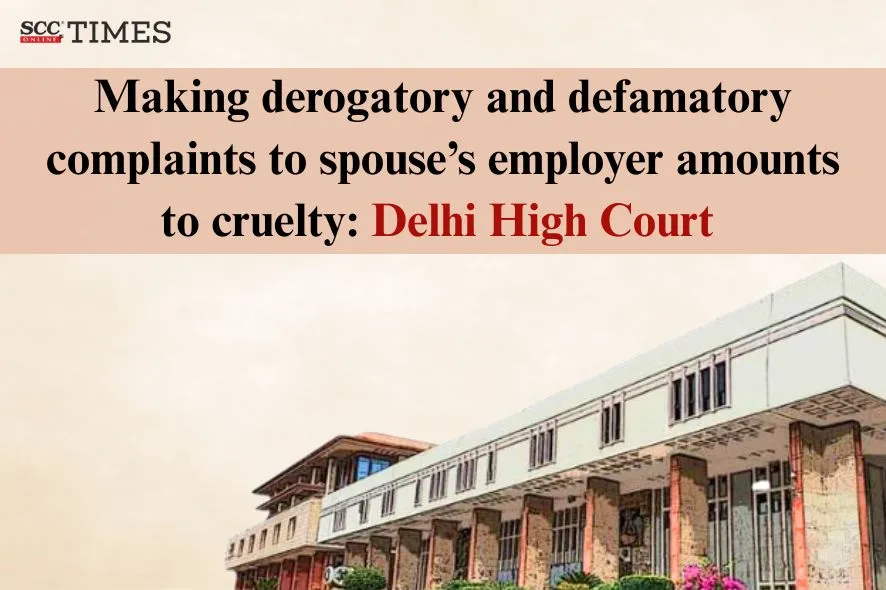Delhi High Court: In an appeal under Section 19 of the Family Courts Act, 1984 challenging the decree of divorce passed under Section 13(1)(ia) of the Hindu Marriage Act, 1955 (‘HMA’) by the Principal Judge, Family Courts, West District, Tis Hazari Courts, Delhi (‘Family Court’), the Division Bench of Renu Bhatnagar* and Navin Chawla JJ., stated that the complaints made by wife to her husband’s employer, especially those involving unsubstantiated claims of adultery, could not be treated to address the issues of any wrong done to her, as the husband’s employer had nothing to do with all such wrongs.
The Court stated that irrespective of the merits of these complaints, making such derogatory and defamatory remarks in the form of complaints to the spouse’s employer were nothing but cruelty. Thus, the Court stated that there was no infirmity in the impugned judgment passed by the Family Court and accordingly, dismissed the appeal.
Background:
The marriage between the parties was solemnized on 7-5-1989 according to Hindu rites, and they were blessed with two children, a son and a daughter. The wife alleged that in June 2011, the husband abandoned her and their children and sold the matrimonial home without informing her. He neither provided them with alternate accommodation nor extended any financial support, leaving them to fend for themselves. Furthermore, he did not share the proceeds from the sale of the house or pay any maintenance. When the wife sought to assert her rights by filing a complaint under the Protection of Women from Domestic Violence Act, 2005 (‘DV Act’) thehusband allegedly resorted to illegal methods to forcibly evict her and the children from the house, leading to serious financial hardship.
The wife claimed that she raised both children alone, incurring significant debt, while the husband initiated multiple litigations to harass and dispossess her and the children. The wife further stated that the husband filed a divorce petition by levelling false accusations of adultery involving and claims of mental and physical cruelty. He further accused the wife of lodging frivolous complaints and making representations against his employer. Since, the divorce petition filed by husband was allowed, the aggrieved wife had filed the present appeal.
Case Analysis and Decision
The Court in the present appeal acknowledged that the marriage and the birth of two children were admitted facts, and that the parties had been living separately since 2010—2011. Both parties had alleged adultery against each other. However, neither party was able to substantiate these allegations with credible evidence. Thus, the Court found no fault with the Family Court’s rejection of these unproven allegations.
On the issue of cruelty, the Court while referring to the definition of cruelty under Section 13(1)(ia) of the HMA stated that it is a settled position of law that the instances of cruelty are not to be taken in isolation, instead, a cumulative effect of the facts and circumstances, is to be taken up and only then a fair inference as to whether the petitioner has been subjected to mental cruelty is to be drawn.
The Court stated that the complaints made by wife her husband’s employer, especially those involving unsubstantiated claims of adultery, could not be treated so as to address the issues of any wrong done to her, as the husband’s employer had nothing to do with all such wrongs and lead to the irresistible conclusion that they were made to harass the husband and to humiliate him in his workplace before his colleagues. The Court held that irrespective of the merits of these complaints, and regardless of whether the allegations made therein were false or true, making such derogatory and defamatory remarks in the form of complaints to the employer of the spouse were nothing but cruelty.
The Court stated that the marriage entails mutual respect and adjustment. Some parties take less time to adjust with each other while the other takes longer time, but it is expected of both the parties to show due respect to each other. The foundation of a sound and healthy marriage is tolerance, adjustment and mutual respect.
Furthermore, with respect to the physical acts of cruelty by the wife, including beating the husband with a wooden stick, pouring water on him, and using abusive languages, etc, the Court did not find any perversity in the observations of the Family Court. The Court supported that these allegations, were supported by medical records and tape-recorded conversations, unlike the wife’s allegations which were not corroborated by evidence.
The Court noted that the parties have not cohabitated since 2010-11 and have been fighting this litigation for a very long time. Therefore, given that the parties had been living separately for around 15 years, without any resumption of marital cohabitation, could also be considered as an added ground while deciding the divorce petition.
Thus, the Court found no infirmity in the impugned judgment and accordingly dismissed the present appeal.
[A v. B, 2025 SCC OnLine Del 5073, decided on 1-7-2025]
Judgement authored by- Justice Renu Bhatnagar
Advocates who appeared in this case:
For the Appellant: Prashant Machanda, Nancy Shah & Isha Baloni, Advocates.


